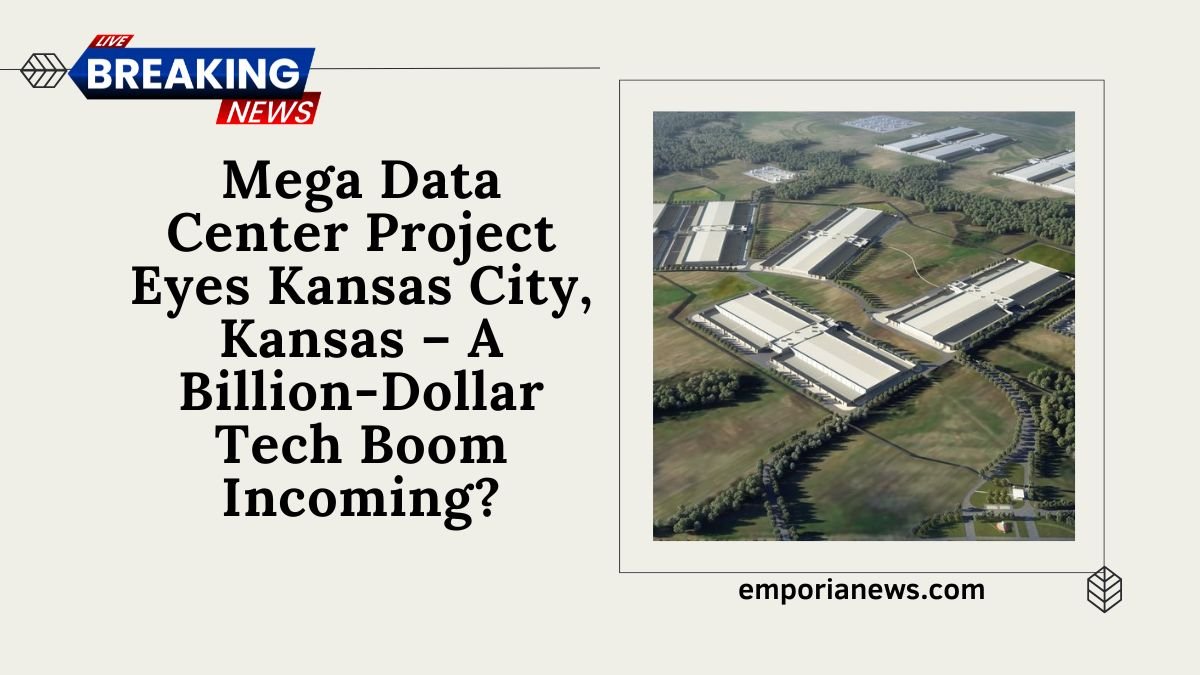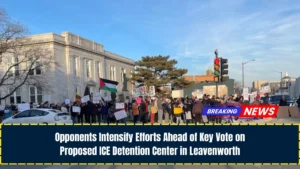A transformative proposal is on the table for Kansas City, Kansas: a $12.6 billion data center campus that could redefine the region’s economic and technological landscape.
Spearheaded by Red Wolf DCD Properties, this ambitious project aims to establish a 550-acre hyperscale data center, potentially positioning the city as a pivotal hub in the digital infrastructure network.
Project Overview: A Glimpse into the Future
The proposed data center campus is slated to be constructed on a 550-acre site bisected by Parallel Parkway, approximately four miles north of the Kansas Speedway. The development plan includes:
- Six buildings totaling 1.8 million square feet.
- Each building designed to resemble office spaces rather than industrial complexes.
- Incorporation of 8-foot earth berms, over 3,000 trees, and extensive landscaping to minimize visual impact on surrounding neighborhoods.
- Residential properties set back 500 to 1,400 feet from the nearest data center building.
This design approach aims to blend the facility seamlessly into the existing community fabric, addressing potential aesthetic concerns from local residents.
Economic Implications: A Catalyst for Growth
The data center project is poised to deliver substantial economic benefits:
- Property Tax Revenue: An estimated $12.9 million annually, a significant increase from the current $43,000 generated by the site.
- Job Creation: Opportunities in construction, maintenance, and operations, bolstering local employment.
- Infrastructure Investment: Developers have pledged to fund utility upgrades, including the construction of two substations to handle the facility’s energy demands.
These developments could stimulate ancillary economic activities, further enhancing the region’s growth trajectory.
Energy and Environmental Considerations
The facility’s energy requirements are substantial:
- Power Consumption: Expected to consume 600 megawatts, exceeding the current 500 MW capacity of the Board of Public Utilities (BPU).
- Utility Upgrades: Plans to draw power from the Southwest Power Pool, enhancing power resiliency and generating additional revenue for BPU.
While the project promises economic gains, it also raises environmental concerns:
- Water Usage: Data centers typically require significant water resources for cooling systems.
- Community Impact: Potential effects on local water wells and the serene nature of the area have been points of contention among residents.
Developers have committed to conducting thorough environmental assessments to mitigate adverse effects.
Community Response: A Spectrum of Opinions
The proposal has elicited mixed reactions from the community:
- Support: Advocates highlight economic growth, job creation, and increased tax revenues.
- Opposition: Critics express concerns about environmental impact, noise, and the transformation of the area’s character.
Local resident Richard Lavin, associated with Liberty Church located near the proposed site, voiced apprehensions about the project’s proximity to the church and its potential to disrupt the tranquil environment.
Regulatory Milestones: Navigating the Approval Process
The project’s progression hinges on several regulatory approvals:
- Planning Commission Vote: The Unified Government Planning Commission of Wyandotte County and Kansas City, Kansas, endorsed the proposal with a 4-2 vote.
- Upcoming Decisions: The Unified Government Board of Commissioners is scheduled to vote on the rezoning on June 26.
These decisions will determine the project’s trajectory and its alignment with community interests.
Comparative Analysis: Data Center Landscape in the Midwest
Kansas City, Kansas, is not alone in attracting data center investments:
| Company | Location | Investment | Status |
|---|---|---|---|
| Northland, Missouri | Undisclosed | Under Construction | |
| Meta | Northland, Missouri | Undisclosed | Under Construction |
| Red Wolf DCD | Kansas City, Kansas | $12.6 Billion | Pending Approval |
The Midwest’s appeal lies in its low land costs, affordable utilities, and state tax incentives, making it an attractive destination for tech giants seeking to expand their infrastructure.
The proposed $12.6 billion data center in Kansas City, Kansas, represents a significant opportunity for economic advancement and technological prominence. However, it also necessitates careful consideration of environmental impacts and community sentiments.
As the project moves through the approval process, transparent communication and collaborative planning will be essential to ensure that progress harmonizes with the preservation of the community’s character and resources.




